SPEKTRA develops and produces a wide variety of vibration and shock exciters, which could be used in calibration systems as well as in measurement and test systems of small objects (e.g. sensors, electronic components, …) or to apply defined dynamic forces to larger mechanical structures for modal analysis. They also have power amplifiers to drive any vibration or modal exciters.
As a whole turnkey system, we provide vibration and shock test system from PROSIG to measure, record and analyze the vibration and shock pulses.
The overview of the vibration test system is shown below.

Featured Products
Vibration Exciters
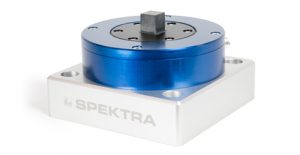
SE-16
Rugged vibration exciter that has been specially developed for high frequency excitation of small components and sensors both in the longitudinal and transverse direction.
- Frequency Range: 5 kHz – 100 kHz
- Max. Acceleration: 400 m/s2
- Max. Force: 12 N
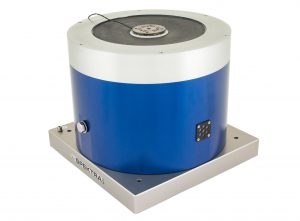
SE-14
Spring-guided vibration exciter that is suitable for daily use in the calibration laboratory as well as for vibration tests.
- Frequency Range: 0 Hz – 8 kHz
- Max. Acceleration: 500 m/s2
- Max. Displacement (peak-peak): 20 mm
- Max. Force: 265 N
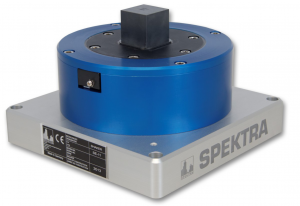
SE-11
The SE-11 high frequency vibration exciter was developed especially for the characterization of sensors, MEMS and small components.
- Frequency Range: 1 kHz – 50 kHz
- Max. Force: 100 N
- Max. Displacement (peak to peak): 30 μm
- Resonance Frequency: 52 kHz
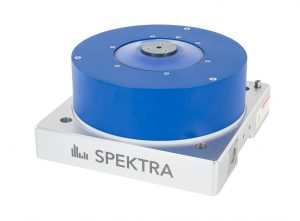
SE-29
Innovative high frequency vibration exciter with efficient electrodynamic drive. The SE-29 offers a very wide frequency range and low transverse motion. Thanks to the wide temperature range and the high payload, the SE-29 is optimally suited for larger sensors or geophones. Besides high quality components, the focus lays on a versatile field of application and easy implementation into existing test environments.
- Frequency Range: 3 Hz to 50 kHz (with optional internal reference standard)
- Max. Acceleration (sine-peak): 450 m/s2
- Max. Force (sine-peak): 95 N
- Max. Displacement (peak-peak): 10 mm
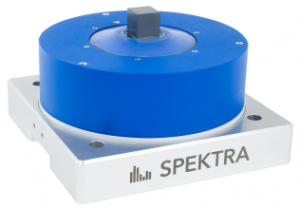
SE-21
With its electrodynamic drive system, the SE-21 offers a very wide frequency range with low transverse motions. A high payload, simple operation in a climatic chamber (as SE-21T) and the many extensions enable the SE-21 to be used as a multi-tool for testing, characterizing and calibrating vibration sensors or smaller electronic devices.
- Frequency Range: 3 Hz to 50 kHz (with optional internal reference standard)
- Max. Acceleration (sine-peak): 390 m/s2 For SE-21, 350 m/s2 For SE-21T
- Max. Force (sine-peak): 95 N
- Max. Displacement (peak-peak): 10 mm
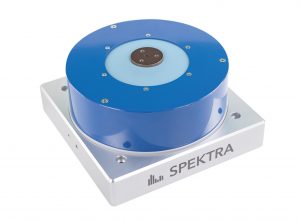
SE-20
The SE-20 offers a very wide frequency range, low transverse motion, wide temperature range and high payload. In addition to top quality components, the focus is on a versatile user field and easy implementation in existing test environments.
- Frequency Range: 3 Hz to 20 kHz (with optional internal reference standard)
- Max. Acceleration (sine-peak): 600 m/s2
- Max. Force (sine-peak): 95 N
- Max. Displacement (peak-peak): 10 mm
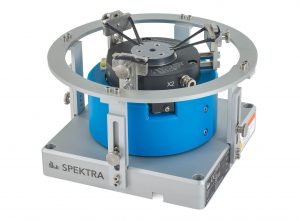
SE-09
The air-bearing SE-09 high-frequency calibration exciter is a high-tech product developed especially for the high demands of calibration laboratories and metrology institutes as well as for characterization of MEMS sensors.
- Frequency range: DC – 50 kHz (internal reference standard 5 Hz – 50 kHz)
- Resonance Frequency: 52 kHz
- Max. Force: 100 N
- Max. Displacement (peak-peak): 8 mm
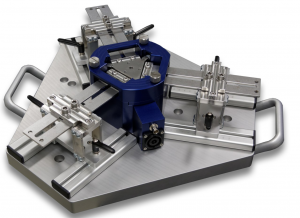
SE-101 RES-HA
The vibration exciter SE-101 RES-HA is deliberately operated in a certain resonance to cost-effectively generate harmonic acceleration-time signals with very high acceleration amplitudes with a compact 100 N drive. Main applications are amplitude linearity tests of sensors, vibration testing at high accelerations.
- Frequency Range: 65 Hz – 500 Hz
- Max. Acceleration: 4000 m/s2
- Max. Stroke: 10mm
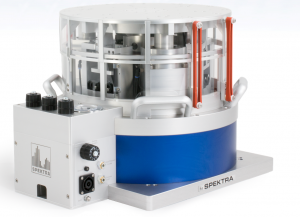
SE-13
Air-bearing electrodynamic Vibration Exciter with mounting table for high payloads up to 50 kg. Especially developed for the calibration and testing of big and heavy low frequency seismic sensors as well as geophones.
- Patent Pending
- Frequency Range: 0 – 400 Hz
- Max. Acceleration: 60 m/s2 peak
- Max. Force: 500 N
- Max. Displacement (peak-peak): 25 mm
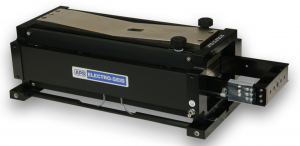
APS 113-AB
Air-bearing ELECTRO-SEIS® Long Stroke vibration exciter – especially developed for the calibration and testing for low frequency sensors and sensor characterization.
- Frequency Range: 0 – 200 Hz
- Max. Force: 133 N (optional: 186 N)
- Max. Displacement (peak-peak): 158 mm
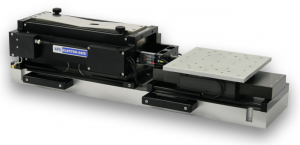
APS 129
Air-bearing ELECTRO-SEIS® Long Stroke Vibration Exciter with mounting table for high payloads up to 23 kg. Especially developed for the calibration and testing of big and heavy low frequency sensors as well as for sensor characterization.
- Frequency Range: 0 – 200 Hz
- Max. Force: 133 N (optional: 186 N)
- Max. Displacement (peak-peak): 158 mm
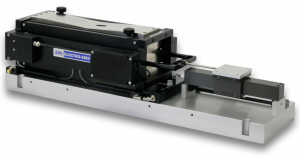
APS 500
Air-bearing ELECTRO-SEIS® Long Stroke vibration exciter with mounting table for payloads up to 3 kg. Especially developed for the calibration and testing of compact low frequency sensors and for sensor characterization at higher acceleration.
- Frequency Range: DC – 200 Hz
- Max. Force: 95 N
- Max. Displacement (peak-peak): 152 mm
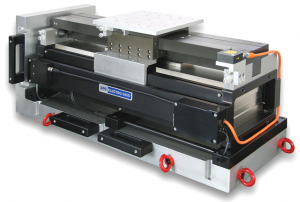
APS 600
Air-bearing ELECTRO-SEIS® Long Stroke vibration exciter with mounting table for very high payloads. Especially developed for the calibration and testing of geophones and heavy seismic sensors.
- Frequency Range: DC – 100 Hz
- Max. Force: 215 N
- Max. Displacement (peak-peak): 450 mm

APS 113
Ball-bearing ELECTRO-SEIS® Long-Stroke vibration exciter for modal analysis of oscillatory structures.
- Frequency Range: DC – 200 Hz
- Max. Force: 133 N (optional: 186 N)
- Max. Displacement (peak-peak): 158 mm
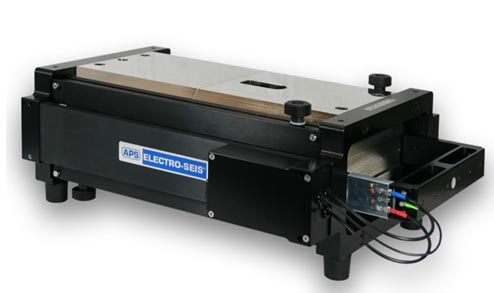
APS 400
ELECTRO-SEIS® Long-Stroke vibration exciter with 450 N max. force that is suitable for excitation of large structures such as ceilings or bridges.
- Frequency Range: DC – 200 Hz
- Max. Force: 445 N
- Velocity (Sine Peak): 1000 mm/s
- Max. Displacement (peak-peak): 158 mm
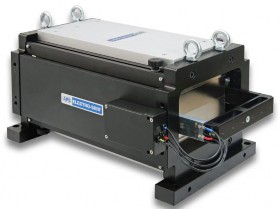
APS 420
The strongest ELECTRO-SEIS® Long-Stroke vibration exciter to date is used for vibration tests of airplanes and other large structures. With a maximum force of 900 N and up to 150 mm stroke the shaker unlocks a new performance level without giving up all other advantages of the APS shaker family (i.e. compact dimensions, transportability, permanent magnets)
- Frequency Range: DC – 200 Hz
- Max. Force: 900 N
- Velocity (Sine Peak): 1000 mm/s
- Max. Displacement (peak-peak): 150 mm

CV-05 Mobile Calibrator
The CV-05 is a mobile, battery-powered calibrator e.g. for on-site testing of human vibration measuring devices in accordance with ISO 8041. Highlights are the user-friendly interface, a high payload up to 300 g and the traceable DAkkS calibration certificate (corresponds to ILAC-MRA).
- Frequency: 79.58 Hz / 159.15 Hz
- Acceleration (m/s² RMS): 1; 2; 3; 4; 5; 6; 7; 8; 9; 10
- Displacement (μm RMS):
- 4; 8; 12; 16; 20; 24; 28; 32; 36; 40 (@ 79.58 Hz)
- 1; 2; 3; 4; 5; 6; 7; 8; 9; 10 (@ 159.2 Hz)
- Max. Payload: 300 g (0.66 lbs) resp. 200 g (0.44 lbs) – depending on frequency
Shock Exciters
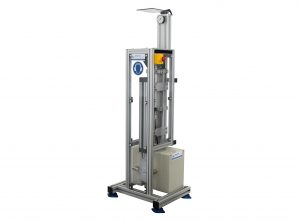
SE-201 PN-LMS
Pneumatically driven shock exciter for the amplitude range of 5 gn to 10,000 gn to be used in calibration or test applications with larger pulse duration up to 5 ms.
- NEW: dynamic shock pressure calibration possible
- Min. Shock Amplitude: 5 gn (50 m/s2)
- Max. Shock Amplitude: 10,000 gn (100,000 m/s2)
- Pulse Duration (typically): 0.1 ms – 5 ms
- Type of excitation: Half Sine Shock
- Max. Sensor Mass (DUT): 80 gram

SE-210 SP-LS
Shock pendulum with integrated reference sensor and shock amplitudes up to 200 gn.
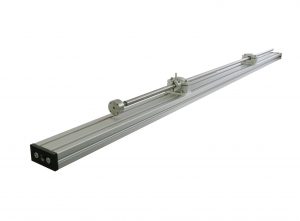
SE-220 HOP-MS
The SPEKTRA HOP-MS shock exciter is for testing and calibrating acceleration sensors as well as for environmental testing of small assemblies and parts.
- Patent-protected Medium-shock exciter
- for the amplitude range from 20 gn up to 4,000 gn (200 m/s2 to 40,000 m/s2).
- This exciter provides the force impact using a piezo-actuator (patented).
- Adjustable signal shape, amplitude, pulse width
- This allows new possibilities to control the mechanical shock signal and with its new applications in the field of the calibration and in particular in the field of measurement and test systems (e.g. to test the shock sensibility of MEMS sensors).
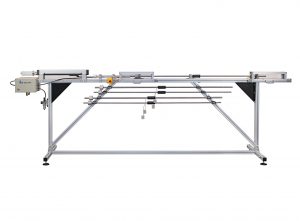
SE-221
Shock exciter for testing and calibration of shock transducers as well as complete measuring instruments (measuring chain) according to ISO 16063-22.
- Shock Amplitude: 1,000 to 100,000 gn (High shock bar), 5,000 to 200,000 gn (Very High shock bar)
- Sensor mass (DUT), max.: 15 g / 30 g (depending on selection of Hopkinson-bar)
- Sinusoidal shock as type of excitation
- Realization of all automatic calibrations according to own test regime (up to 20 shocks/minute)
- Secondary calibration of shock transducers and measuring chains according to ISO 16063-22
- Secondary calibration of shock accelerometer reference standards
Power Amplifiers
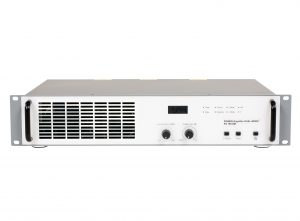
PA180 DM
For all vibration exciters that require a 180 VA power amplifier (load impedance 0.8 Ω). The PA 180 DM offers a max. frequency range DC to 100 kHz, small harmonic distortion, excellent stability even with temperature or supply line variations and helpful protection functions.
- Frequency Range: 40 Hz to 20 kHz (at full power), DC to 100 kHz (small signal)
- Max Power Output: 180 VA into a 0.8 Ω resistive load
- Switch between voltage and current mode
- Phase Shift (0° or 180°)
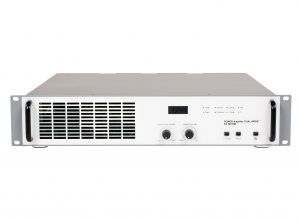
SPEKTRA PA 500 DM
For all vibration exciters that require a 500 VA power amplifier (load impedance 4 Ω). The PA 500 DM offers a max. frequency range from DC to 200 kHz, small harmonic distortion, excellent stability even with temperature or supply line variations and helpful protection functions.
- Frequency Range: 40 Hz to 60 kHz (at full power), DC to 200 kHz (small signal)
- Power output, max.: 500 VA into a 4 Ω resistive load
- Switch between voltage and current mode
- Phase shift (0° or 180°)
- Variable gain control
- Current limit control
- Temperature protection
- Range of Use: R&D departments in industry, environment testing laboratories, calibration laboratories, universities and research institutes
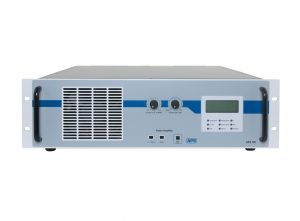
APS 145
800 VA power amplifier for low-frequency vibration exciters
- 800 watt power amplifier for modal shakers and environmental analysis
- DC coupled amplifier
- Voltage and power mode
- Fitted to suit the vibration exciters APS 400, APS 420 and APS 600
- Safety appliances fitted to used exciter
Vibration & Shock Measurement System
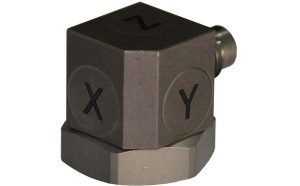
Accelerometer
Some of the vibration accelerometers for measurement include:
- BSWA Single Axis Accelerometers
- BSWA Triaxial Accelerometers
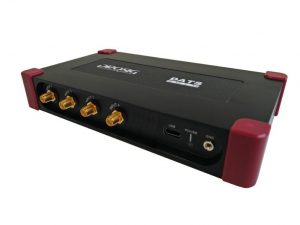
DATS-Solo
Prosig 4-Channel, Pocket-Sized, USB-Powered, 24-bit Data Acquisition Hardware
- No. of input channels: 4 analogue (IEPE or Voltage) inputs
- Maximum sampling rate: 144k samples/sec per channel (24 bit)
- Communications: USB
- Ultra Portable (Pocket Sized)
- Low Power (USB Powered)
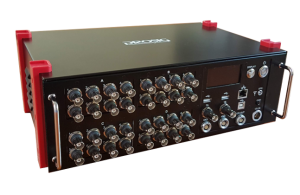
DATS-tetrad
Multi-channel, standalone, 24-bit Data Acquisition System
- No. of input channels: Up to 32 analogue inputs (plus tachos)
- Maximum sampling rate: Up to 300,000 samples/sec per channel (24 bits) and Up to 800,000 samples/sec per channel (16 bits)
- Resolution: 24 bit
- Communications: Ethernet (Gigabit), USB, Wifi
- Multi Rate Sampling: Multiple sampling rates can run concurrently on separate cards
- Can be powered from mains, vehicle or its internal battery power
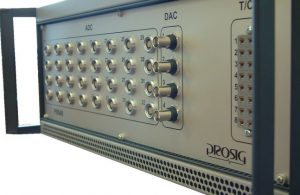
DATS-hyper12
Can be configured with up to 12 modules from measurement card range
- No. of input channels: Single Unit: Up to 92 Channels (plus tachos), Stacked Units: >1000 Channels
- Max sampling rate: Up to 300,000 samples/sec per channel (24 bits) and Up to 800,000 samples/sec per channel (16 bits)
- Communications: USB , Ethernet (Gigabit)(Plus version)
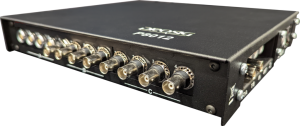
DATS-P8012
Can be configured with up to 3 modules from measurement card range
- No. of input channels: Up to 24 channels (plus tachos)
- Max sampling rate: Up to 300,000 samples/sec per channel (24 bits) and Up to 800,000 samples/sec per channel (16 bits)
- Communications: USB , Ethernet (When connected to DATS-tetrad or DATS-PROLOG system)
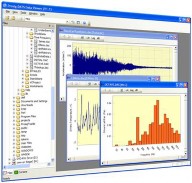
DATS Software
Prosig Data Acquisition & Analysis Software
DATS is a comprehensive package of data acquisition, signal processing and reporting tools. It allows the users to capture the data and results can be used for shock spectral and vibration analysis, etc.
